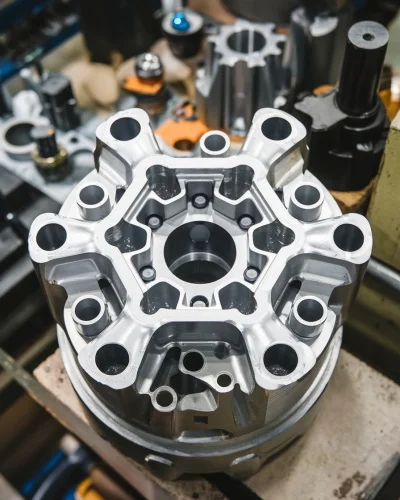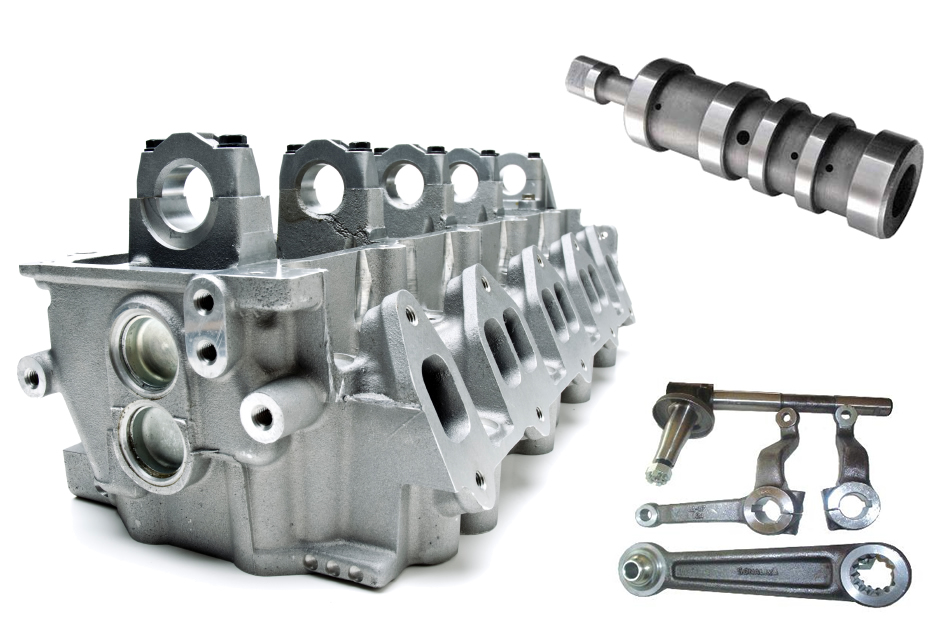The Future of Light Weight Aluminum Foundries: Innovations and trends Forming the Industry
The light weight aluminum factory market is undergoing substantial transformation. Key trends highlight the value of sustainability and performance. Innovations in clever production and automation are ending up being prevalent. Foundries are significantly focused on using recycled products. This shift questions regarding future techniques and innovations. How will these modifications impact manufacturing techniques and market dynamics? The solutions may redefine the sector landscape in unexpected ways.
Innovations in Smart Production Technologies
As the aluminum foundry industry advances, innovations in smart production modern technologies are coming to be increasingly vital for enhancing efficiency and efficiency. The combination of automation, synthetic knowledge, and the Net of Points (IoT) is changing typical factory procedures. These modern technologies make it possible for real-time monitoring of processes, enabling prompt changes that maximize output and decrease waste.
Additionally, device discovering formulas assess manufacturing data to recognize patterns and predict upkeep needs, reducing downtime. Robotics are significantly used for repetitive jobs, releasing proficient workers to concentrate on more intricate difficulties. Furthermore, digital twins-- online versions of physical procedures-- assist in simulations that can enhance style and operational methods.
The adoption of these wise production technologies is driving affordable advantages in the aluminum foundry sector. By enhancing operations and boosting decision-making capabilities, factories can fulfill expanding market needs while keeping high-quality standards. The future of light weight aluminum factories is indisputably connected to these technological technologies.
Accepting Eco-Friendly Materials and Processes
The light weight aluminum shop industry is progressively concentrating on green materials and processes to boost sustainability. This change includes the adoption of lasting product sourcing, energy-efficient production techniques, and effective recycling and waste management strategies. By incorporating these practices, factories aim to minimize their ecological effect while maintaining competitiveness on the market.
Lasting Material Sourcing
How can light weight aluminum shops enhance their sustainability initiatives? Lasting material sourcing has become a necessary method in accomplishing this goal. By prioritizing recycled light weight aluminum, foundries can substantially lower their environmental footprint, as recycled products require less power and less resources compared to main light weight aluminum production. Furthermore, sourcing products from accredited distributors who adhere to environment-friendly methods promotes liable mining and reduces ecological effect. Foundries are likewise discovering alternative materials, such as biopolymers and environmentally friendly coatings, to complement typical light weight aluminum processes. Teaming up with stakeholders, including distributors and ecological companies, fosters technology in sourcing techniques. Inevitably, welcoming sustainable product sourcing not just straightens with international sustainability goals yet also settings aluminum factories as leaders in environmentally accountable manufacturing.
Energy-Efficient Production Techniques
Aluminum foundries are progressively embracing energy-efficient production techniques to complement their lasting product sourcing campaigns. These approaches concentrate on lessening energy consumption throughout the manufacturing process. Advanced innovations, such as induction melting and optimized spreading procedures, are being implemented to lower the overall carbon impact. Additionally, automation and clever production systems boost operational effectiveness, allowing for better energy management. Foundries are additionally exploring the combination of renewable resource resources, such as solar and wind, to power their procedures. By prioritizing energy performance, aluminum foundries not just reduced production expenses but additionally straighten themselves with global sustainability objectives, making sure an extra ecologically liable strategy to aluminum manufacturing while satisfying the climbing need for green practices in the industry.
Reusing and Waste Management
Embracing green products and processes, light weight aluminum foundries are focusing on recycling and waste management approaches to improve sustainability in their procedures. By incorporating closed-loop systems, these facilities are decreasing waste and taking full advantage of source efficiency. Scrap aluminum, a conveniently offered material, is being recycled on-site, greatly reducing the demand for virgin materials and reducing power intake. Technologies in arranging and processing technologies better assist in the recycling of aluminum, ensuring that also contaminated products can be repurposed properly. Furthermore, factories are taking on sustainable techniques such as minimizing contaminated materials and advertising using biodegradable materials for product packaging. This commitment to reusing not only reduces ecological influence however additionally improves the economic feasibility of aluminum factories in a competitive market.
The Role of Automation and Robotics
Automation and robotics are increasingly transforming the aluminum foundry industry, substantially boosting manufacturing efficiency. By incorporating innovative innovations, foundries can reduce labor expenses while all at once boosting safety and security requirements for their workforce. This shift not only enhances procedures yet additionally positions the industry for sustainable growth in a competitive market.
Improved Manufacturing Effectiveness
Reinventing manufacturing processes, the assimilation of advanced robotics and automation modern technologies has come to be a keystone for light weight aluminum foundries seeking improved effectiveness. These innovations streamline process, minimize cycle times, and boost product high quality by minimizing human mistake. Automated systems can keep track of manufacturing lines in real-time, enabling for immediate changes that enhance output. On top of that, robotics facilitate the handling of harmful materials, making certain safer functioning settings while boosting throughput. Anticipating maintenance modern technologies also add to efficiency by expecting equipment failings, thereby decreasing downtime. As a result, aluminum shops can attain better consistency in their products while reacting extra swiftly to market needs. This embrace of automation is establishing a brand-new standard for performance and functional excellence within the sector.

Minimizing Labor Expenses
The shift in the direction of progressed robotics and automation in light weight aluminum factories not just boosts manufacturing efficiency but also plays a significant function in lowering labor costs. By incorporating automated systems, foundries can decrease the dependence on manual work, which frequently involves high incomes and training costs. Robotics enhance recurring jobs these details such as putting, molding, and completing, allowing for a higher output with less employees. This technological change not just reduces labor-related costs however also boosts consistency and high quality in manufacturing. Moreover, automation can operate around the clock, taking full advantage of functional hours without the connected prices of overtime or shift differentials. Therefore, aluminum factories can accomplish significant cost savings while keeping affordable pricing in a progressing market landscape.
Improving Safety Specifications
While traditional aluminum foundry operations usually expose workers to harmful atmospheres, the integration of robotics and automation considerably enhances safety and security requirements within the sector. Automated systems can execute risky tasks, such as molten metal handling and heavy lifting, minimizing human direct exposure to unsafe problems. In addition, robotics can operate in harmful ambiences and extreme temperatures, efficiently reducing the danger of injury. Advanced checking technologies and synthetic knowledge guarantee real-time safety and security evaluations, enabling view publisher site immediate feedbacks to potential threats. Additionally, automation enhances workflows, reducing the likelihood of accidents created by human error. Consequently, the fostering of these technologies not only enhances security however additionally fosters an extra effective and efficient workplace in aluminum shops.
Enhancing Power Performance in Production
As aluminum foundries look for to keep competition in an evolving market, improving energy effectiveness in manufacturing has emerged as a vital focus. By adopting innovative technologies such as high-efficiency melting heaters and automated temperature level controls, factories can especially minimize energy usage. Executing real-time surveillance systems enables for accurate tracking of power use throughout the production procedure, enabling quick modifications to enhance performance.
Furthermore, changing to alternate energy resources, including sustainable alternatives, can even more lower the carbon footprint. The integration of power recovery systems, which redeem waste warmth for reuse, is ending up being progressively common. Educating workers in energy monitoring methods ensures that every person involved in the production process is conscious of energy usage.
These efforts not just reduced operational costs but additionally line up with international sustainability goals, positioning aluminum shops as accountable players in the sector while enhancing their overall competition. - Precision aluminum casting
Innovations in Recycling Aluminum
Developments in reusing aluminum have obtained momentum alongside efforts to enhance energy efficiency in manufacturing. The light weight aluminum sector has actually welcomed sophisticated modern technologies that streamline the reusing procedure, minimizing power usage and environmental impact. Strategies such as hydrometallurgy and brand-new sorting innovations improve the extraction of light weight aluminum from scrap, improving return prices and making sure higher top quality recycled material.
The growth of closed-loop recycling systems allows foundries to recycle aluminum without substantial deterioration in top quality, making the process a lot more sustainable. Advancements in logistics and collection, consisting of improved radar and automated sorting, have actually likewise played a necessary role in increasing the efficiency of light weight aluminum recovery. These advancements not just add to a circular economic situation however likewise aid alleviate the carbon impact associated with aluminum manufacturing. As the demand for sustainable practices expands, these developments position the light click here now weight aluminum shop industry as a leader in accountable resource administration.
Replying To Market Demands and Customer Trends
Flexibility has come to be a cornerstone for aluminum foundries reacting to developing market demands and customer trends. As sectors progressively prioritize sustainability, light weight aluminum foundries are shifting towards environmentally friendly methods, including improved recycling processes and reduced carbon impacts. This shift straightens with consumer preferences for environmentally accountable items, driving factories to introduce their offerings.
In addition, the rise of lightweight materials in auto and aerospace fields necessitates developments in aluminum alloys and casting strategies. Foundries are investing in r & d to generate high-strength, lightweight elements that fulfill stringent efficiency criteria.
In addition, personalization has actually acquired grip, with consumers seeking customized solutions. Light weight aluminum factories are leveraging advanced production modern technologies, such as 3D printing, to suit particular customer demands effectively. This responsiveness not only satisfies consumer demands yet also positions light weight aluminum foundries competitively in a dynamic market landscape, ensuring their significance in an ever-changing industrial setting.

Frequently Asked Questions
Just How Do Aluminum Foundries Impact Local Economies?
Light weight aluminum shops substantially affect neighborhood economic climates by creating tasks, stimulating need for neighborhood distributors, and adding to area advancement. Their procedures often bring about enhanced tax revenues, which can fund crucial public services and framework improvements.
What Are the Safety Rules for Aluminum Shop Employees?
Safety and security regulations for aluminum foundry employees include compulsory personal protective equipment, appropriate air flow systems, normal training on dangerous products, and adherence to guidelines established by job-related health and wellness managements to lessen risks and assurance worker safety. - aluminum casting
Just How Does Light Weight Aluminum Recycling Affect Global Supply Chains?
Light weight aluminum recycling significantly minimizes demand for raw products, boosts source performance, and maintains rates. This shift impacts international supply chains by cultivating a circular economy, advertising sustainability, and guaranteeing an extra durable sector in rising and fall markets.
What Career Opportunities Exist in the Aluminum Shop Industry?
Different profession possibilities exist in the aluminum factory industry, including roles in engineering, quality assurance, production monitoring, and research study and development. Skilled labor settings such as mold makers and maker operators are likewise popular.
How Do International Trade Policies Impact Light Weight Aluminum Foundries?
International profession plans greatly impact aluminum foundries by influencing import tolls, supply chain characteristics, and market gain access to. These aspects can influence operational costs, competitiveness, and general profitability within the global light weight aluminum manufacturing landscape.
By focusing on recycled aluminum, foundries can considerably reduce their ecological impact, as recycled products need less power and less sources compared to primary light weight aluminum manufacturing. Aluminum factories are increasingly adopting energy-efficient manufacturing strategies to complement their lasting product sourcing initiatives. Automation and robotics are progressively transforming the light weight aluminum factory industry, considerably boosting manufacturing efficiency. The shift towards advanced robotics and automation in aluminum shops not only improves manufacturing effectiveness but additionally plays a substantial role in minimizing labor expenses. As light weight aluminum shops look for to keep competitiveness in an advancing market, improving power effectiveness in production has arised as an essential emphasis.